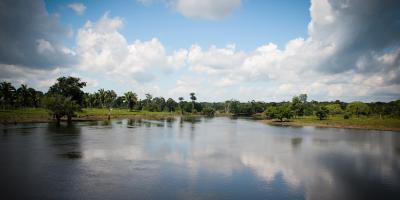
On Saturday 12th December in the north-eastern suburbs of Paris, a momentous shift was made in the world’s commitment to tackling climate change. Just a month on from the devastating terrorist attacks, amidst security tensions, celebrated news came out of the French capital with the announcement of the Paris Agreement at the 21st Conference of the Parties to the UN Framework Convention on Climate Change (UNFCCC CoP21).
The representatives of 196 countries had succeeded beyond expectations. For the two weeks preceding, parties had been tensely negotiating the final text of the accord, which included: a new, universal agreement, back by a ‘High Ambition Coalition’ of over 100 countries; the submission of more than 150 Nationally Determined Contributions (NDCs) - climate action plans - which cover 186 countries and more than 90% of the world’s greenhouse gas emissions; commitments of $100 billion a year to the Green Climate Fund for climate action by 2020; and the mobilization of a broad coalition of actors for the implementation of the Paris CoP21 outcomes.
It was only in the final hours of negotiations that the High Ambition Coalition of over 100 countries, including the US, all of the EU, Canada and 79 African, Caribbean and Pacific countries, emerged. Its four key aims included a legally binding agreement, a clear long-term goal on global warming, a mechanism for reviewing countries’ emissions commitments every five years, and a unified system for tracking progress.
Legal certainty is crucial in addressing climate change
The Paris Agreement achieved these and more, offering a fresh opportunity for progress towards much needed global and domestic responses to climate change. With it, opportunities also emerged for the contribution of the law and governance community to tackling one of the most crucial global challenges facing us today. The agreement itself and nearly all the NDCs contemplate legal and institutional reform; some also note the importance of human rights in diverse contexts. The hard work, vision and leadership of those like former Irish President Mary Robinson, John Knox, the UN Special Rapporteur for Human Rights and the Environment, and Victoria Tauli-Corpuz, the UN Special Rapporteur for the Rights of Indigenous Peoples, secured recognition in the Paris Agreement of the link between human rights and climate change and an explicit commitment to equity in its implementation.
IDLO applauds the achievement and maintains that the rule of law and climate justice policy issues such as legal certainty, transparency, equity and liability are crucial to addressing climate change. We also welcome the successful inauguration of an annual climate law and governance day.
Representing a fundamental shift in the global approach to the climate change challenge, the Paris Agreement treaty, its mechanisms, and the NDCs open up an important opportunity for rule of law approaches to make a lasting difference in tackling the issue, from legal and institutional reform to access to climate justice.
by Marie-Claire Cordonier Segger, Senior Legal Expert - Sustainable Development
Photo: Sam Sokwoo

